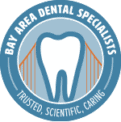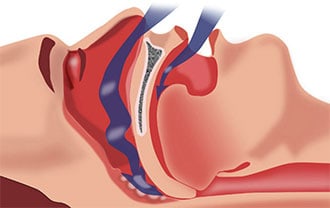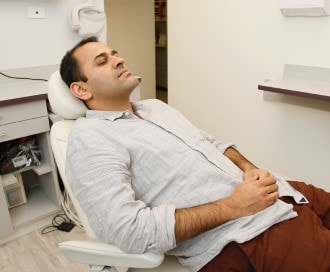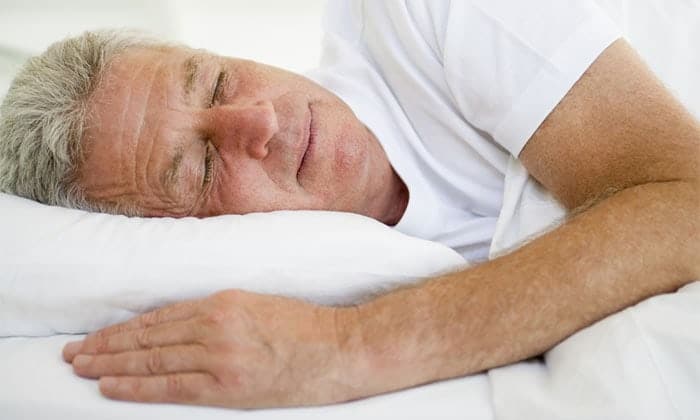
Oral Appliance Therapy is a sleep apnea treatment that uses a mouth guard-like device to open up your airways so they are unobstructed during sleep. It is a comfortable and effective treatment for mild-to-moderate sleep apnea, and has been recommended by the American Academy of Sleep Medicine as an excellent alternative to a CPAP (Continuous Positive Airway Pressure) machine.
Dr. Bhave delivers effective sleep apnea treatment by providing custom-fitted oral appliances to our patients.
Issues with CPAP
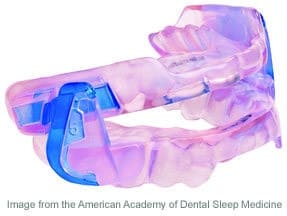
The use of a CPAP machine has been a standard treatment for people suffering from sleep apnea. The CPAP machine opens up your airways by providing a steady flow of air through a mask that is placed over your nose and mouth.
A CPAP is effective, but only about 50% of patients typically use it because it is uncomfortable to wear and creates noise from its electric motor. A CPAP is also difficult to travel with, as it is a bulky unit that needs its own carrying case.
Our doctors can provide a simple, effective alternative to the CPAP machine using oral appliances. They are both specially trained and experienced in Oral Appliance Therapy.
Oral Appliance Therapy Details
If you have mild to moderate sleep apnea, our doctors can provide you with a custom-fitted oral appliance, similar to a mouth guard. The appliance consists of two trays that are connected together and fit over your upper and lower teeth.
While wearing the trays, the lower jaw is comfortably repositioned slightly forward and down. This keeps your airway open and significantly improves your breathing while you sleep.
Studies of Oral Appliance Therapy show a very high success rate in patients who suffer from mild to moderate sleep apnea. Patients find it much more comfortable to use than a CPAP machine and very convenient for travel.
What is Sleep Apnea?
Sleep apnea (from the Greek apnous, meaning “without breath”) is a sleep disorder which causes a person to stop breathing while sleeping, often many times during the night. Symptoms include heavy snoring during sleep and tiredness during waking hours.
Obstructive sleep apnea (OSA) is the most common form of sleep apnea. It occurs when the muscles in the back of the throat relax too much during sleep and cause the lower jaw to fall backward. This collapses the airway and severely hinders or interrupts breathing completely.
Each interruption can last anywhere from a few seconds to over a minute. The frequency of occurrence can range from a few times per hour to hundreds of times in one night.
These constant interruptions during sleep are very disruptive and will result in varying degrees of feeling tired, irritable or mentally foggy when awake. More extreme levels of sleep apnea can result in severe sleep deprivation while simultaneously increasing risk for other serious issues such as heart problems, liver problems, high blood pressure and diabetes.
Symptoms of Sleep Apnea
Typical symptoms of sleep apnea include:
- Snoring, gasping or choking during sleep
- Waking up with a very sore or dry throat
- Restless sleep
- Morning headaches
- Daytime sleepiness, regardless of how many hours you were in bed
- Irritability or trouble concentrating
- Memory Loss
- Decreased sex drive
Testing for Sleep Apnea
As needed, the doctor will conduct appropriate testing to find out if you are suffering from sleep apnea, as well as how severely it is affecting you. This could include your answering sleep surveys or having your airways inspected with high-tech measuring devices.
The doctor may also recommend that you participate in a formal sleep study. During this test, you wear a small monitoring device during sleep that tracks your breathing patterns as well as your heart, lung and brain activity. The doctor will let you know if these additional tests are recommended after a comprehensive exam and consultation.
Sleep Apnea FAQ
Why do I need a dentist for sleep apnea treatment?
A dentist is a valuable part of your treatment team for sleep apnea. Dentists are often the first medical professionals to recognize signs of this health condition. Dr. Bhave asks patients questions during routine appointments to identify symptoms of obstructive sleep apnea and evaluates their airways. If she suspects sleep apnea, Dr. Bhave refers patients to a physician specialist for diagnosis.
Physicians specializing in sleep disorders may recommend oral appliance therapy through a qualified dentist, such as Dr. Bhave in San Jose. Our dentist works with the diagnosing physician and provides custom-fabricated oral appliances. She monitors your progress and addresses concerns with the fit and function of the mouthguard-like trays. Your physician ensures the oral appliance is working through follow-up testing.
What are the benefits of oral appliance therapy for sleep apnea?
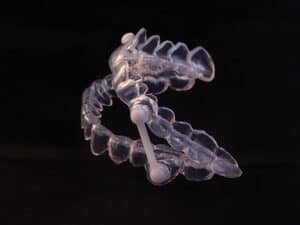
Is sleep apnea treatment covered by insurance?
Oral appliances for sleep apnea do not fall under your dental insurance plan; these devices apply to your medical insurance because sleep apnea is a medical condition. Medicare covers sleep apnea treatment with oral appliance therapy. Private insurance providers often base their coverage on Medicare and typically cover the cost of sleep apnea treatment. However, you will need to check with your insurance policy to determine your coverage for oral appliance therapy, and our office can help you understand your plan. Your insurance provider may have special requirements and need documentation before they cover the cost of oral appliance therapy.
Does sleep apnea need to be treated?
Yes, untreated obstructive sleep apnea causes worsening symptoms, including fatigue, memory loss, and headaches in the morning. Research suggests untreated sleep apnea can increase risks for other health conditions, such as stroke, type 2 diabetes, congestive heart failure, hypertension, and coronary artery disease.
Do dental appliances for sleep apnea work?

How are oral appliances created for patients?
Getting an oral appliance for sleep apnea involves a physical or digital impression of your teeth. A dental lab uses these models to make the oral appliance and sends it to our San Jose dentistry office. Dr. Bhave will make sure the trays fit your mouth appropriately and adjust as necessary for effective positioning of your jaw and optimal comfort. She will explain how to clean your oral appliance, and you should see your physician to confirm the treatment is working.
